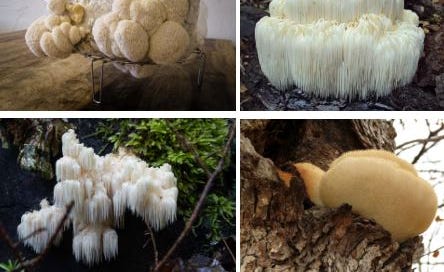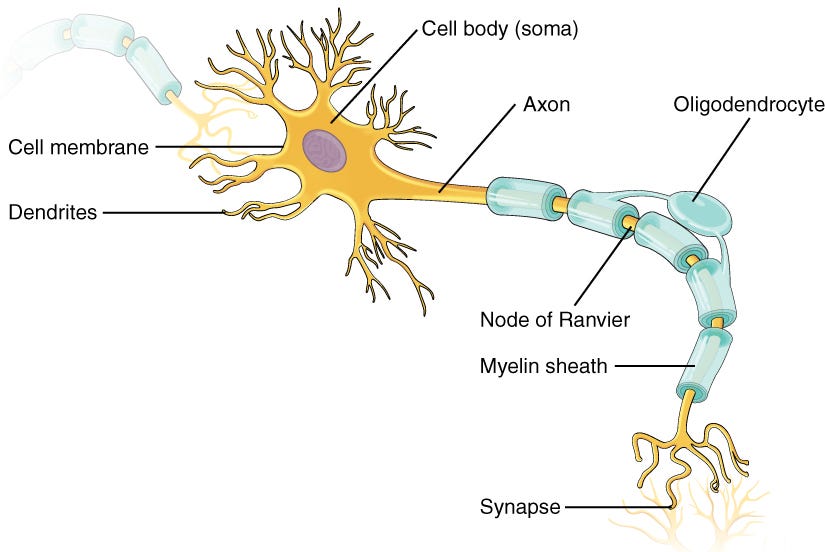🍄Ancient Use
Lion’s Mane (Hericium erinaceus) is a saprophytic mushroom found throughout the Northern Hemisphere. It has been used for centuries in Traditional Chinese Medicine as a tonic to ease stress, anxiety, and depression. It was also recognized for its neuroprotective benefits and its ability to enhance cognitive function 🧠.
🧬Relevant Physiology
To understand how a natural supplement like Lion’s Mane can protect the brain, it helps to know how neurons—the fundamental units of the nervous system—function. These cells, found in the brain and spinal cord, transmit signals that control everything from movement and memory to sensation and emotion 💭.
🧪 What is Nerve Growth Factor (NGF)?
NGF is a crucial protein for the growth, survival, and maintenance of neurons. It belongs to the neurotrophin family—molecules essential for brain health, neural regeneration, and cognitive function.
🧠 Key Functions of NGF:
Neuron Growth & Survival – Supports the development and maintenance of neurons in the brain and peripheral nervous system🧠
Neuroprotection – Prevents degeneration linked to Alzheimer’s and Parkinson’s 🧓
Synaptic Plasticity – Enhances memory, learning, and brain adaptability 🧩
Myelin Repair – Supports fast, efficient nerve signal transmission through myelin sheath maintenance ⚡
Anti-Inflammatory Effects – May reduce brain inflammation linked to cognitive decline 🔥 (1)
📉 NGF & Brain Health
NGF levels decline with age, contributing to cognitive decline and neurodegenerative disease
Low NGF has been linked to Alzheimer’s, Parkinson’s, and depression (2,3)
Boosting NGF through diet, exercise, meditation, and nootropic supplements (like Lion’s Mane) may help support long-term brain health
🌿Major Phytochemical: Erinacine
Erinacine is a terpene compound found in Lion’s Mane, known for its ability to cross the blood-brain barrier🚧 and stimulate NGF production (4)
🔑 Key Research Findings on Erinacine:
Increases NGF levels, enhancing neuron survival and brain function (5,6)
Reduces brain damage after stroke in animal studies (7)
Decreases amyloid-β plaques in Alzheimer’s models (8)
Protects against oxidative stress in Parkinson’s models (9)
Improves mood and alleviate depressive symptoms by restoring neurotransmitter levels (10)
Boosts memory and learning while slowing age-related decline (11)
🔬 These findings support Lion’s Mane’s traditional use in neuroprotection, cognitive enhancement, and mental health support.
🧪 Clinical Trials in Patients with Cognitive Impairment
🧓 Lion’s Mane for Mild Cognitive Impairment
In a double-blind, placebo-controlled trial, adults aged 50–80 with mild cognitive impairment took 1g of Lion’s Mane powder 3x/day for 16 weeks. The Lion’s Mane group showed significant cognitive improvements at weeks 8, 12, and 16.
⚠️ Benefits declined 4 weeks after stopping the supplement, suggesting consistent use is needed.
Cognitive assessments included orientation to time and place, word repetition, serial subtraction, counting backward, and word recall.
The only reported side effect was mild gastrointestinal discomfort🤢, but the supplement was otherwise well tolerated (12).
🧠Erinacine for Mild Alzheimer’s Disease
Another double-blind, placebo-controlled study tested Erinacine A-enriched capsules (350 mg) over 49 weeks in patients with mild Alzheimer’s. Participants showed significant improvements in cognitive assessments, including the Cognitive Abilities Screening Instrument (CASI), Mini-Mental State Examination (MMSE), and Instrumental Activities of Daily Living (IADL) scores.
🧠 CASI — evaluates attention, memory, language, fluency, judgment, and orientation.
📝 MMSE — assesses orientation, recall, registration, attention, and calculation and is commonly used as a dementia screening tool in the U.S.
🏠 IADL — measures the ability to perform daily tasks independently, such as household chores, meal preparation, financial management, shopping, and telephone use.
These findings suggest that lion’s mane supplementation may slow cognitive decline in patients with mild dementia (13).
🧪Clinical Trials in Healthy Adults
👵🏽🧠Cognitive Function in Older Adults
Healthy adults over 50 took 0.8g of Lion’s Mane 4x/day. Results showed improved MMSE scores, especially in orientation to time compared to the placebo group (14).
🧑🎓 Cognitive Performance in Young Adults
In another study, 41 healthy adults (aged 18–45) took 1.8g of lion’s mane daily (15).
Findings:
⚡ Improved performance on the Stroop task after a single dose
😌 Reduced perceived stress after 28 days
📊 The Stroop Task assesses attention and mental flexibility—e.g., saying the color of the word “Blue” when it’s written in red ink:
✅Safety and Side Effects
🧡Well-Tolerated: Most people can consume lion’s mane without any issues. No major liver toxicity has been noted (17).
🤢Gastrointestinal Discomfort: Mild, self-limited stomach upset, nausea, or diarrhea has been reported in some cases, especially with higher doses.
🩸Blood thinning: Lion’s mane may have slight blood thinning effects, so those on blood thinners or anticoagulants may want to use with caution.
📋How to Take Lion’s Mane Safely
1. 🏷️Choose a High-Quality Source
Organic & Third-Party Tested: Ensure your supplement or dried mushrooms come from reputable brands that test for contaminants like heavy metals and pesticides.
Fruiting Body vs. Mycelium: Look for products containing the fruiting body, as it has higher levels of beneficial compounds.
2. 🧪Start with a Low Dose
Begin with 250-500 mg per day (if using supplements) or a small portion if eating fresh/dried mushrooms.
Gradually increase the dose based on tolerance, up to 1-3 grams daily for most people.
3. 🍵Best Ways to Consume
Capsules/Powder: Convenient and easy to measure. Add powder to smoothies, coffee, or tea.
Extracts/Tinctures: Dual-extracted (water & alcohol) tinctures offer better absorption of active compounds.
Fresh or Cooked Mushrooms: Can be sautéed, added to soups, or brewed into tea.
4.🕒When to Take It
Morning or Early Afternoon: Some people report increased focus and energy, so taking it earlier may prevent sleep disturbances.
With Food: Helps minimize potential stomach discomfort.
References:
Szućko-Kociuba I, Trzeciak-Ryczek A, Kupnicka P, Chlubek D. Neurotrophic and Neuroprotective Effects of Hericium erinaceus. Int J Mol Sci. 2023 Nov 3;24(21):15960. doi: 10.3390/ijms242115960. PMID: 37958943; PMCID: PMC10650066.
Lorigados Pedre L, Pavón Fuentes N, Alvarez González L, McRae A, Serrano Sánchez T, Blanco Lescano L, Macías González R. Nerve growth factor levels in Parkinson disease and experimental parkinsonian rats. Brain Res. 2002 Oct 11;952(1):122-7. doi: 10.1016/s0006-8993(02)03222-5. PMID: 12363411.
Maes M, Rachayon M, Jirakran K, Sodsai P, Sughondhabirom A. Lower Nerve Growth Factor Levels in Major Depression and Suicidal Behaviors: Effects of Adverse Childhood Experiences and Recurrence of Illness. Brain Sci. 2023 Jul 18;13(7):1090. doi: 10.3390/brainsci13071090. PMID: 37509019; PMCID: PMC10377511.
Chen YY, Lin TW, Li IC, Tsung L, Hou CH, Yang CY, Li TJ, Chen CC. A pilot pharmacokinetic and Metabolite identification study of Erinacine A in a Single landrace pig model. Heliyon. 2024 Sep 11;10(18):e37850. doi: 10.1016/j.heliyon.2024.e37850. PMID: 39315194; PMCID: PMC11417322.
Kawagishi H., Shimada A., Shirai R., et al. Erinacines A, B and C, strong stimulators of nerve growth factor (NGF)-synthesis, from the mycelia of Hericium erinaceum. Tetrahedron Letters. 1994;35(10):1569–1572. doi: 10.1016/S0040-4039(00)76760-8.
Mori K, Obara Y, Hirota M, Azumi Y, Kinugasa S, Inatomi S, Nakahata N. Nerve growth factor-inducing activity of Hericium erinaceus in 1321N1 human astrocytoma cells. Biol Pharm Bull. 2008 Sep;31(9):1727-32. doi: 10.1248/bpb.31.1727. PMID: 18758067.
Lee K. F., Chen J. H., Teng C. C., et al. Protective effects of Hericium erinaceus mycelium and its isolated erinacine A against ischemia-injury-induced neuronal cell death via the inhibition of iNOS/p38 MAPK and nitrotyrosine. International Journal of Molecular Sciences. 2014;15(9):15073–15089. doi: 10.3390/ijms150915073.
Chen CC, Tzeng TT, Chen CC, Ni CL, Lee LY, Chen WP, Shiao YJ, Shen CC. Erinacine S, a Rare Sesterterpene from the Mycelia of Hericium erinaceus. J Nat Prod. 2016 Feb 26;79(2):438-41. doi: 10.1021/acs.jnatprod.5b00474. Epub 2016 Jan 25. PMID: 26807743.
Lee KF, Tung SY, Teng CC, Shen CH, Hsieh MC, Huang CY, Lee KC, Lee LY, Chen WP, Chen CC, Huang WS, Kuo HC. Post-Treatment with Erinacine A, a Derived Diterpenoid of H. erinaceus, Attenuates Neurotoxicity in MPTP Model of Parkinson's Disease. Antioxidants (Basel). 2020 Feb 4;9(2):137. doi: 10.3390/antiox9020137. PMID: 32033220; PMCID: PMC7070543.
Chiu CH, Chyau CC, Chen CC, Lee LY, Chen WP, Liu JL, Lin WH, Mong MC. Erinacine A-Enriched Hericium erinaceus Mycelium Produces Antidepressant-Like Effects through Modulating BDNF/PI3K/Akt/GSK-3β Signaling in Mice. Int J Mol Sci. 2018 Jan 24;19(2):341. doi: 10.3390/ijms19020341. PMID: 29364170; PMCID: PMC5855563.
Lee LY, Chou W, Chen WP, Wang MF, Chen YJ, Chen CC, Tung KC. Erinacine A-Enriched Hericium erinaceus Mycelium Delays Progression of Age-Related Cognitive Decline in Senescence Accelerated Mouse Prone 8 (SAMP8) Mice. Nutrients. 2021 Oct 19;13(10):3659. doi: 10.3390/nu13103659. PMID: 34684662; PMCID: PMC8537498.
Mori K, Inatomi S, Ouchi K, Azumi Y, Tuchida T. Improving effects of the mushroom Yamabushitake (Hericium erinaceus) on mild cognitive impairment: a double-blind placebo-controlled clinical trial. Phytother Res. 2009 Mar;23(3):367-72. doi: 10.1002/ptr.2634. PMID: 18844328.
Li IC, Chang HH, Lin CH, Chen WP, Lu TH, Lee LY, Chen YW, Chen YP, Chen CC, Lin DP. Prevention of Early Alzheimer's Disease by Erinacine A-Enriched Hericium erinaceus Mycelia Pilot Double-Blind Placebo-Controlled Study. Front Aging Neurosci. 2020 Jun 3;12:155. doi: 10.3389/fnagi.2020.00155. PMID: 32581767; PMCID: PMC7283924.
Saitsu Y, Nishide A, Kikushima K, Shimizu K, Ohnuki K. Improvement of cognitive functions by oral intake of Hericium erinaceus. Biomed Res. 2019;40(4):125-131. doi: 10.2220/biomedres.40.125. PMID: 31413233.
Docherty S, Doughty FL, Smith EF. The Acute and Chronic Effects of Lion's Mane Mushroom Supplementation on Cognitive Function, Stress and Mood in Young Adults: A Double-Blind, Parallel Groups, Pilot Study. Nutrients. 2023 Nov 20;15(22):4842. doi: 10.3390/nu15224842. PMID: 38004235; PMCID: PMC10675414.
LiverTox: Clinical and Research Information on Drug-Induced Liver Injury [Internet]. Bethesda (MD): National Institute of Diabetes and Digestive and Kidney Diseases; 2012-. Lion’s Mane. [Updated 2024 Jan 5]. Available from: https://www.ncbi.nlm.nih.gov/books/NBK599740/
Images:
https://www.picturethisai.com/wiki/Hericium_erinaceus.html;https://itoldya420.getarchive.net/amp/media/hericium-americanum-fungus-05d670;https://www.flickr.com/photos/maxorz/51532791858;https://www.flickr.com/photos/treegrow/30940101600;https://commons.wikimedia.org/wiki/File:1206_The_Neuron.jpg;https://doi.org/10.3390/ijms242115960








I am reading LOTS about this in various health and good eating publications etc.